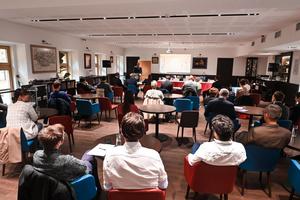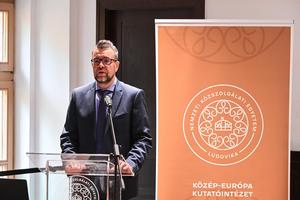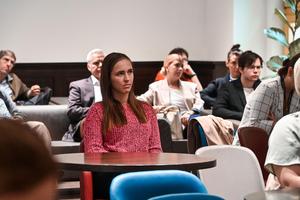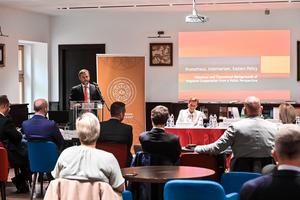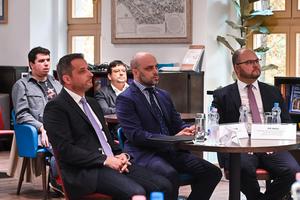The conference held by the Ludovika University of Public Service's (LUPS) Eötvös József Research Center (EJRC) on Friday had special relevance, as parliamentary elections were held in the country on October 15. In light of this, the distinguished speakers placed even greater emphasis on what role the historically significant Central European region plays in future foreign policy relations.
Pál Hatos, the head of the Ludovika University of Public Service's EJRC Central Europe Research Institute, highlighted in his opening speech that they were delighted to organize such an event with renowned participants from Poland at this critical moment.
Speaking about the Central Europe Research Institute, Pál Hatos recalled that the institute was established four years ago with the assistance of the university's leadership. He emphasized that there are numerous concepts related to Central Europe. He detailed that Hungary aligns more closely with the Danube-centered concept of Central Europe. He believes that this kind of "Habsburg-monarchic path" is strong in our country. He pointed out that, of course, Poland has a different perspective, with a greater focus on the east. He added that the common denominator is the bridge role between Germany and Russia. Pál Hatos emphasized that the presence of the Polish Ambassador at the conference indicates that the event was organized at a pivotal moment.
Bernát Török, the director of LUPS's EJRC, explained in his welcoming speech that the conference focusing on the history and present of Central Europe is one of the university's highly important topics. He said that the Central Europe Research Institute was established four years ago by the university with the aim of paying more attention to research in some strategically important areas.
The director stressed that the outcome of the Polish elections and the relationship between the Polish and Hungarian governments have political significance beyond themselves, especially concerning European political processes. He highlighted that Poland and Hungary share a common history in Central Europe that is worth exploring in depth. He stated that this conference helps us better understand Poland's role in Central Europe and the Polish-Hungarian relationship.
Sebastian Kęciek, Ambassador Extraordinary and Plenipotentiary of the Republic of Poland, highlighted at the conference that Poland's interests have led to regional cooperation, enabling them to join the European community. The ambassador explained that the Visegrád Four's cooperation recently became the most active and successful multidimensional cooperation platform in Central Europe, but the Russian aggression against Ukraine has changed this situation. On the one hand, it strengthened the NATO alliance, and on the other hand, the differing reactions to the war in Ukraine led to a weakening of relations among friendly countries and a change in Europe's role.
"We must now do everything to rebuild our alliance. We need each other in this region more than ever," emphasized Sebastian Kęciek. He mentioned that the war in Ukraine has once again shown how important cooperation is. As an example, he cited new security challenges that, in his opinion, the V4 countries must address collectively.
The conference featured renowned international speakers, including Mitrovits Miklós, a senior researcher at the Central Europe Research Institute, who outlined the historical and theoretical background of Polish geographical thinking. He stated that, essentially, the country did not exist as an independent state before 1918, but different programs existed at the turn of the 20th century regarding how to build Polish statehood, where its borders would be, and ultimately, what would guarantee the security of the new state.
Agnieszka Orzelska-Stączek, the project leader at the Institute of Political Studies of the Polish Academy of Sciences, discussed the contradictory narratives of the Three Seas Initiative in her presentation. She emphasized that this cooperation project, focused on infrastructure development in the eastern and southern parts of the European Union, has three key elements: transportation, energy, and digital infrastructure.
In the afternoon section, Łukasz Lewkowicz, an analyst at the Central Europe Institute of the Visegrád Group in Lublin, explained the forms of regional cooperation from the perspective of Polish foreign policy.
Marlena Gołębiowska, an analyst at the Central Europe Institute in Lublin, shared her thoughts on the past and future of Central European economic cooperation.
Zsombor Zeöld, in his presentation, illuminated how the war in Ukraine changed the situation of regional cooperation. He mentioned that a new foreign policy approach came to power in the United States in 2016, which treated both China and Russia as main competitors. According to him, from there, the emphasis shifted decisively away from the Central European countries.
Text: Éva Harangozó
Photo: Dénes Szilágyi

